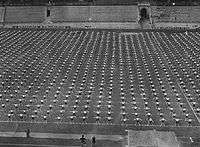Gioventù Italiana del Littorio
 | |
| Motto |
Libro e moschetto, fascista perfetto (Book and rifle, perfect Fascist) |
|---|---|
| Formation | 1937 |
| Type | Youth organization |
| Legal status | Defunct, illegal |
Region served | Kingdom of Italy |
Parent organization | National Fascist Party |
The Gioventù Italiana del Littorio (GIL) (English: Italian Youth of the Lictor) was the consolidated youth movement of the National Fascist Party of Italy that was established in 1937,[1] to replace the Opera Nazionale Balilla (ONB) It was created to supervise and influence the minds of all youths, that was effectively directed against the influence of the Catholic Church on youths.[2]
Character

The organization surpassed its purpose as a cultural institution that was intended to serve as the ideological counterpart of school, and served as a paramilitary group (training for future assignments in the Italian Army), as well as education in the career of choice, technology (including postschool courses for legal adults), or education related to home and family (solely for the girls). It carried out indoctrination with a message of Italian-ness and Fascism, training youths as "the fascists of tomorrow".
Moreover, the GIL took charge of all activities initiated by schools, and pressured teachers to enlist all students. Aside from the usual "Fascist Saturdays", children would spend their summers in camps (which included the national-level Campi Dux, reunions of Balilla and Avanguardisti).
Male children enrolled wore a uniform adapted from that of the Blackshirts: the eponymous black shirt, the fez of Arditi tradition, grey-green trousers, black fasces emblems, and azure handkerchiefs (i.e.: in the national colour of Italy). During military exercises, they were armed with scaled-down version of Royal Italian Army service rifle, Moschetto Balilla[3] (the rifles were replaced with replica versions for the Figli della Lupa).
References
- ↑ Alexander J. De Grand. Fascist Italy and Nazi Germany: the 'fascist' style of rule. 2nd edition. London, England, UK; New York, New York, USA: Routledge, 1997. Pp. 66.
- ↑ Jean-Guy Prévost. A total science: statistics in liberal and Fascist Italy. McGill-Queen's University Press, 2009. Pp. 228
- ↑ http://www.il91.it/balilla.html